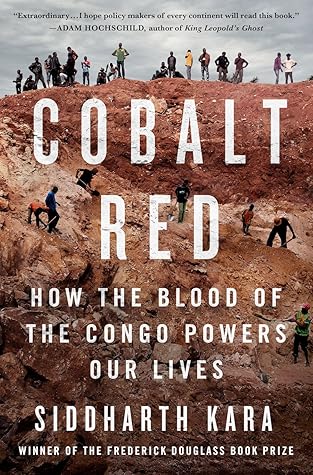More on this book
Community
Kindle Notes & Highlights
Read between
May 26 - June 5, 2024
On the contrary, across twenty-one years of research into slavery and child labor, I have never seen more extreme predation for profit than I witnessed at the bottom of global cobalt supply chains.
Millions of trees have been clear-cut, dozens of villages razed, rivers and air polluted, and arable land destroyed. Our daily lives are powered by a human and environmental catastrophe in the Congo.
Throughout much of history, mining operations relied on the exploitation of slaves and poor laborers to excavate ore from dirt. The downtrodden were forced to dig in hazardous conditions with little regard to their safety and for little to no compensation.
They argued that Africans worked in pleasing conditions on the islands. When those arguments failed, the slavers claimed they made changes that remedied the offenses taking place on the plantations. After all, who was going to go all the way to the West Indies and prove otherwise, and even if they did, who would believe them?
At no point in their history have the Congolese people benefited in any meaningful way from the monetization of their country’s resources. Rather, they have often served as a slave labor force for the extraction of those resources at minimum cost and maximum suffering.
In fact, no one seems to accept responsibility at all for the negative consequences of cobalt mining in the Congo—not the Congolese government, not foreign mining companies, not battery manufacturers, and certainly not mega-cap tech and car companies. Accountability vanishes like morning mist in the Katangan hills as it travels through the opaque supply chains that connect stone to phone and car.
All cobalt sourced from the DRC is tainted by various degrees of abuse, including slavery, child labor, forced labor, debt bondage, human trafficking, hazardous and toxic working conditions, pathetic wages, injury and death, and incalculable environmental harm.
Although the copious mineral riches of Katanga could easily fund numerous programs to improve child education, alleviate child mortality, upgrade sanitation and public health, and expand electrification for the Congolese people, most of the mineral wealth flows out of the country.
“In Congo, the government is weak. Our state institutions are impotent. They are kept this way so they can be manipulated by the president to suit his ambitions,” Reine said. “Congo is only a bank account for the president,” Gloria added.
“There is an agenda to promote a false picture of the conditions here. The mining companies claim there are not any problems here. They say they maintain international standards. Everyone believes them, so nothing changes.”
“According to the OECD [Organisation for Economic Co-operation and Development], up to seventy percent of the cobalt from the DR Congo has some touch with child labor.
When the Soviet Union collapsed in 1991, Mobutu’s value to the West collapsed with it. A genocide in neighboring Rwanda proved to be the catalyst for his final downfall.
I understood at last how the people of the Congo survived their daily torment—they loved God with full and fiery hearts and drew comfort from the promise of salvation. Although their love was powerful, the evidence was mounting that it was all but unrequited.
They reported that children were typically paid roughly two dollars a day regardless of production and that they received little to no assistance when they suffered injuries. The diggers at Tilwezembe described hazardous conditions and harsh reprisals if they did not obey their bosses. Some were locked inside a shipping container called a cachot (“dungeon”) without food or water for up to two days.
The system was opaque and untraceable by design.
It’s the action, not the fruit of the action, that’s important. You have to do the right thing. It may not be in your power, may not be in your time, that there’ll be any fruit. But that doesn’t mean you stop doing the right thing. You may never know what results come from your action. But if you do nothing, there will be no result. —Mahatma Gandhi


